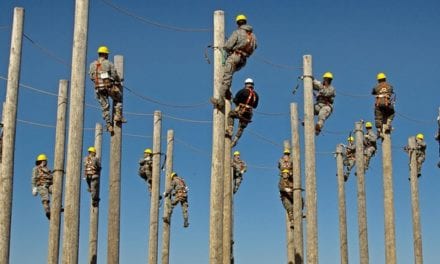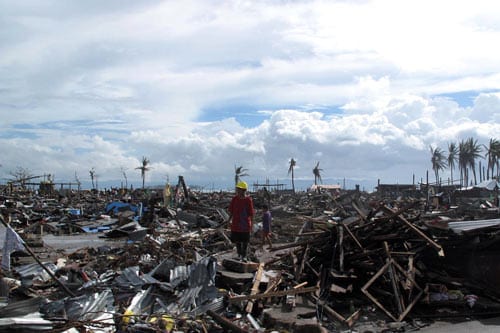The Darang Family and the Super Typhoon
The weather reports on TV declared it a super typhoon, the strongest that the region would ever witness. The news anchor said they even culled reports from international media because the whole world was anticipating a storm more destructive than Katrina, which struck the U.S. in 2005. Dumagat City is visited by an average of ten typhoons a year, aside from the strong rains and winds that are common occurrences during the monsoon season, but a “super typhoon” worried the people. The mayor, interviewed by a reporter sent by a TV station from Manila, announced that the government had readied itself days beforehand, and families living in shanties by the seashore had been moved to classrooms in several public schools. The city stadium had been converted into a mass evacuation center. A warehouse outside the city had been stocked with enough sacks of rice and canned food to feed tens of thousands for at least a week.
Doreen and Gabriel Darang had just finished dinner and were in the bedroom watching the news. Gabriel was seated on the carpeted floor, arms around his knees, staring intently into the screen. Doreen was packing a medium-sized luggage-bag with clothes, enough for three days. Baby Mike, their eight-month old son, was on the bed, sucking his thumb and making gurgling noises.
The family was moving to one of Auntie Minggay’s apartment units until the typhoon passed. Doreen did not want to move. Even Gabriel believed that their house was strong enough to withstand the super typhoon. The house had been Gabriel’s inheritance after his father passed away five years ago. His younger brother was in the States, while a sister lived with her own family in Laguna, and both siblings simply gave Gabriel sole ownership of the house and the ten-hectare family farm in the municipality of Tindalo, five kilometers away from the city.
The house had withstood hundreds of typhoons for more than sixty years since it was built after the Second World War. Its various parts and rooms had also been renovated, reinforced, and refurbished. Last year, the couple retiled the entire kitchen and installed heaters in both the bathrooms. The worst damage ever received was when Typhoon Oryang of 2003 broke the large jalousie windows in the second floor hallway, but only because a slab of tin roof flew through the windows, not because they weren’t tough enough to hold against battering winds and rain. Another super typhoon, Undang, felled the ancient acacia in the front lawn, but left the old house intact.
Auntie Minggay was very insistent, however. She owned a row of three newly-constructed apartment units, and two were currently unoccupied. The apartments were added as an extension to the bungalow where Auntie Minggay lived with Miong, her sixteen-year-old son out of wedlock. She was worried about her niece and grandnephew. She thought they would be safer in her apartment than in the Darang house, which stood on old foundations. Gabriel pointed out to Auntie Minggay that it might not be a good idea to stay in her apartment since it was nearer to the beach. Auntie Minggay replied that the sea was three blocks away from her house, and there was no way that the seawater would rise high enough to spill over three entire blocks. The sea had never overflowed that much, she added. The couple finally relented when Auntie Minggay pleaded with them.
Doreen was Auntie Minggay’s only family in the city. They came from Binilaran, an island in the southern part of the region, two hundred kilometers away—an island separated from the mainland by a channel. Doreen and Auntie Minggay accompanied each other to visit relatives in Binilaran once a year for the Christmas family reunion. The older woman invited her niece frequently to her home—she seldom went out after her vision had deteriorated.
Auntie Minggay kept to the familiar, both in places and people. She knew every inch of her house so she could manage without anyone guiding her about. She invited Doreen for weekend lunches and prepared birthday dinners for the couple. She found the approaching calamity as yet another excuse to invite the family over. She had prepared fresh beddings and stocked canned food and gallons of drinking water in the cupboard.
When the news program was finished, Gabriel asked his wife to get ready and they drove to Auntie Minggay’s. The typhoon was expected to land at dawn the next day. They wanted to be in the apartment before ten that evening.
The night was surprisingly calm. There were no stars, and thick clouds kept the moon hidden from sight. The air was still, as if it was aware of the impending turbulence, waiting with bated breath like the people on the ground. The streets, too, were quiet, with only a few cars on the road. The baby was asleep, strapped in his car seat. Doreen checked on her son and wondered if they had to cancel his first birthday party, happening in ten days. The caterers had been paid and the invitations sent out. They did not foresee the bad weather when they finished with the preparations weeks ago. Now she could only hope that things would be back to normal by Baby Mike’s birthday. Otherwise, they might have to postpone. She reminded herself to call the caterers in two days, and to see about resetting the date to next month if the devastation brought about by the typhoon turned out to be terrible.
It took Gabriel a mere thirty minutes to reach Auntie Minggay’s place. With regular traffic it would have taken an hour, but people were already tucked safely inside their homes. Typhoons were a part of the people’s lives in Dumagat. They knew the drill.
Doreen called Auntie Minggay on the phone before they left the house, to tell her that they were on their way so that when they arrived at the apartment building, Miong was already by the tall gate, holding it open.
After Gabriel parked the car, Miong led the family to their apartment. Doreen accompanied her cousin to Auntie Minggay’s while Gabriel stayed to tuck the baby into bed. Doreen and Auntie Minggay chatted while drinking tea at the dining table. Miong stayed up with them and watched TV in the living room. The next day had already been declared a non-working holiday, so he did not have to worry about going to bed and waking up early for school.
By midnight, light rain pattered the roof. Doreen asked permission from her aunt to retire for the night. She went out, holding closely to the walls as she navigated the short distance to the apartment unit next door, since the tiled floor had become slippery with rainwater. By the time she reached the doorway and let herself in, her blouse was splattered with raindrops. She was surprised to see Gabriel in the downstairs bedroom instead of the larger one upstairs. He reasoned that the rain was noisy as it pounded on the roof upstairs, so he decided to use the bedroom on the ground floor.
After Doreen had showered and changed clothes, she slipped into bed with her husband, the baby snuggled between them. They fell asleep instantly, even the baby dozed peacefully—the room was cold and the bed was warm, while the muted rhythm of the falling rain drummed like a hypnotic lullaby.
Doreen awoke hours later to the howling wind. She glanced at the bedside clock and saw that it was six in the morning. She flicked on the light switch but no light came on. She opened the thick window curtain and looked out. The sky was very downcast and the rain poured in sheets. She looked over at her husband and the baby. Gabriel was snoring but Baby Mike was wide awake, staring at her while sucking his thumb.
The wind continued its racket, shrieking like a thousand cats in heat. The rain fell harder, pounding on the roof like sacks of pebbles being emptied all at once. Doreen woke Gabriel up. He turned on the transistor radio. A newsman confirmed the blackout. They were running on generator power, he said, but could go off the air if the wind broke their transmitter, which had withstood numerous storms before but now teetered in the recent onslaught. As if on cue, while he was reporting on floods already forming in some parts of the city, the radio went dead.
Doreen prayed silently for the wind to stop. They were enclosed by concrete and the windows were shut, yet they could hear it whining and the walls vibrated from the pressure.
The couple were huddled in the middle of the bed with the baby when the window shutters gave way, shattering the windows, sending glass everywhere. The heavy drapes stopped the glass from flying through the room, but weren’t strong enough to hold back what followed: a surge of water which sprang into the room with enormous force—it broke the curtain rod in half.
The wave filled the room with water up to their ankles. Rain pelted in from the open window, and they had a glimpse of the yard. Auntie Minggay’s potted plants had been turned over. A coconut tree fell and now leaned against the gate. The entire yard was flooded, too. Doreen screamed when a sheet of corrugated iron crashed into the wall beside the window frame before being swept up into the black night. The baby started to cry, wails drowned out by the ruckus outside.
Gabriel urged Doreen to go upstairs. She grabbed a blanket and draped it over her shoulders and the baby. She plodded through the muddy seawater. A string of seaweed coiled around Doreen’s ankle. The sea may be three blocks away but the strength of the storm surge had carried the rolling seawater hundreds of meters away from the shore and into the house. They were almost by the stairs when another surge of water poured in through the window. In a second, the height of the flood rose knee-deep.
As the family hurried to climb the stairs to the second floor, they heard a squeaking overhead, metals crushing against each other, then a stream of water rushed down the stairs to meet them. A corner of the roof had peeled back, perhaps from the wind, and the weight of the water which fell through had split the ceiling panel. This sent a cascade pouring into the room, out the hallway, and down the stairs.
The couple entered the bedroom, rushed into the bathroom, and closed the door behind them. They climbed into the dry tub, covered themselves with the blanket, and waited for the storm to pass. The sound of wind and rain were muffled by the thick, concrete wall—the baby went back to sleep in Doreen’s arms.
The storm passed after an hour. Gabriel waited for another hour before he went out to check. Light streamed in from one corner of the bedroom where the ceiling now hang limply downwards. The wind had blown off the metal sheet roofing above it. He hoped it did not remove the entire roof of the house. The floor was soaked and so were the bed and dresser. He stepped out of the bedroom and went downstairs. It was still knee-deep in muck, but a line of dirt on the wall showed that the flood had risen several feet higher while they stayed locked in the bathroom. It seemed to have subsided fast though, the seawater pulled back by the tide.
Gabriel went outside. The sky was crystal clear—only the destruction left in the storm’s wake gave any clue that a storm had passed over. The concrete gate survived the storm, but the bushes in the garden were uprooted. An electric post had been toppled and now blocked the driveway.
Gabriel went back inside and fetched his family. The couple went to the house next door and knocked. They could hear Auntie Minggay answering from upstairs, shouting and crying in her joy and relief that everyone was safe. Miong came down shortly and let them in. They climbed up to Auntie Minggay’s large bedroom where the older woman, sitting up in bed, recounted what she went through that night, not allowing any one else to interrupt her. Gabriel and Doreen sat beside each other on a sofa opposite the bed. They were only too glad to listen to Auntie Minggay. Miong stood by the dresser with the baby in his arms, singing him a lullaby.
The house had survived the onslaught. The shanties that surrounded Auntie Minggay’s row of apartments, however, were flattened. From the open windows they could hear people going through the rubble of planks, nipa and sheets of iron, for whatever they could salvage from their destroyed homes. A child was wailing for her mother. It was always like this every time a super typhoon visited Dumagat. In a week, the makeshift houses would sprout again like mushrooms.
By nightfall, only puddles remained. The next day, Gabriel and Miong scrubbed the mud off the floors and hung the drenched sheets out to dry. The couple decided to stay with Auntie Minggay for another week. Gabriel went to get some clothes. He couldn’t drive because the typhoon left the roads unpassable, power lines and trees knocked down by the wind blocked the roads, so he walked the four kilometers to their house.
To his surprise, their old house stood proudly, unscathed. The wooden fence in the front yard bowed halfway to the ground and the shrubs of bougainvillea were uprooted, but the house itself rose straight amidst a backdrop of gray sky.





















